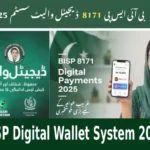
Introduction:
The Benazir Income Support Program (BISP) payments for July to September 2025 are being distributed to millions of low-income families across Pakistan. This government initiative aims to provide essential financial aid directly to women in vulnerable households, empowering them to manage household needs with dignity. Understanding the payment schedule, eligibility, and collection process is vital for beneficiaries to smoothly receive their quarterly cash assistance without any delays or issues.
What is the Benazir Income Support Program (BISP)?
The Benazir Income Support Program is Pakistan’s largest social welfare program focused on poverty alleviation through unconditional cash transfers. Established in 2008, BISP primarily supports low-income families by providing quarterly cash stipends aimed at covering basic needs such as food, health, and education. The program emphasizes women empowerment by disbursing payments to female heads of households, ensuring better financial control and household welfare.
Payment Schedule for July to September 2025
BISP payments for the current quarter are being rolled out in three phases to ensure organized and efficient distribution. Phase 1 payments have started from September 2025 and cover districts in Punjab, Khyber Pakhtunkhwa, Sindh, Balochistan, Azad Jammu & Kashmir, and Gilgit-Baltistan. Beneficiaries must check their respective phase and district to confirm payment timing. Future phases will be announced by BISP for remaining districts.
Who is Eligible for BISP Payments?
Eligibility for BISP payments primarily targets families earning below Rs. 25,000 per month with a strong focus on women as registered recipients. Criteria include:
- Female-headed families with valid CNICs
- Widowed or divorced women without male family support
- Families with disabled members
- Exclusions include government employees, pensioners, and families owning substantial land or assets.
Getting registered accurately and linking CNIC to the BISP digital wallet is essential for timely payment receipt.
How to Collect Your BISP Payment
Beneficiaries must carry their original CNIC and the registered mobile phone linked to their BISP account when collecting money. Payments are transferred to digital wallet accounts, withdrawable via bank agents or ATMs. Always ensure to receive a receipt after collection to prevent disputes. Fingerprint verification is mandatory and beneficiaries should confirm the payment amount displayed before proceeding with verification to avoid fraud or unauthorized deductions.
Digital Wallet System and Security Measures
BISP now employs a secure digital wallet system for disbursing funds, enhancing transparency, convenience, and safety. Payment via wallets helps reduce cash handling risks. Beneficiaries are strictly advised not to share PIN codes or CNIC details to protect against fraud. The phased approach to payments helps avoid overcrowding and logistical challenges while ensuring secure delivery.
Impact of BISP Payments on Families
The BISP payments play a critical role in supporting families’ everyday needs like purchasing food, paying school fees, and managing healthcare costs. By targeting women, the program boosts household decision-making power and economic stability. Many recipients have used this support to start small businesses or sustain family expenses during tough economic times. These payments are often lifelines for marginalized communities across Pakistan.
How to Check Payment Status and Get Support
Beneficiaries can check their payment status conveniently by sending their CNIC number via SMS to the official BISP helpline 8171 or using the online portal. Direct visits to nearby BISP centers also provide support for resolving payment issues or updating information. Confirming payment arrival before collection helps avoid unnecessary trips or delays.
Common Questions About BISP Payments
1. How often are BISP payments made?
BISP payments are distributed quarterly, typically every three months, to registered beneficiaries. The current schedule covers July to September 2025.
2. Can someone else collect the payment on my behalf?
No, only the registered female beneficiary is authorized to receive the payment to ensure transparency and empower women.
3. What if my payment does not appear in the wallet?
Payments may experience delays due to verification. Beneficiaries should wait for official announcements or contact their BISP center to resolve issues.
4. What should I do if I lose my CNIC before payment collection?
A CNIC is mandatory for payment collection. In case of loss, visit NADRA promptly to get a replacement before the payment date.
5. How safe is the digital wallet payment method?
The digital wallet system under BISP uses secured verification processes, but beneficiaries must safeguard their PIN and CNIC details to prevent fraud.
Conclusion:
The Benazir Income Support Program (BISP) payments for July to September 2025 are making a significant difference in the lives of millions of low-income families across Pakistan. By empowering women with direct financial assistance via a safe digital wallet system and meticulous phased distribution, BISP continues to alleviate poverty and promote socio-economic stability. Beneficiaries should stay informed about their payment phase, follow the guidelines for collection, and use available resources to ensure they receive their rightful support smoothly and securely.
This comprehensive guide aims to assist beneficiaries in understanding everything they need about the July to September BISP payments, helping them make the most of this valuable program.

